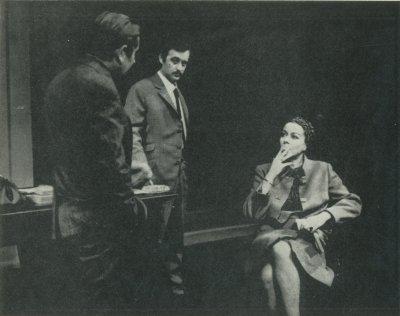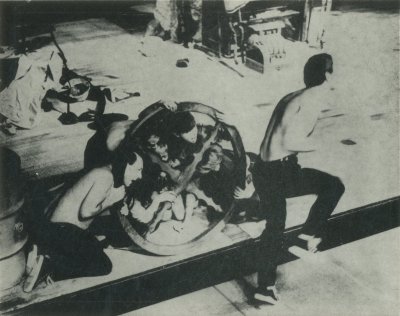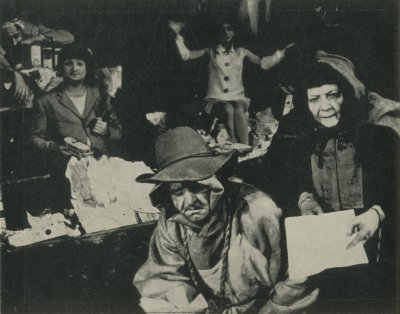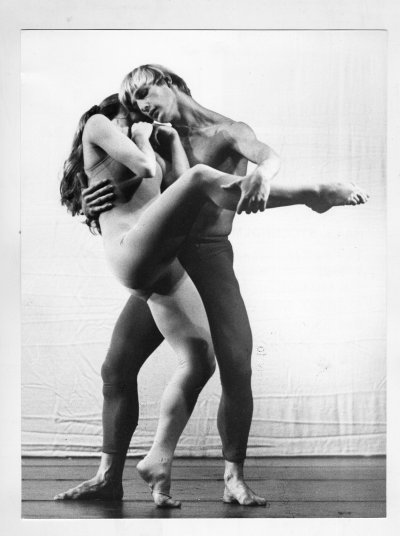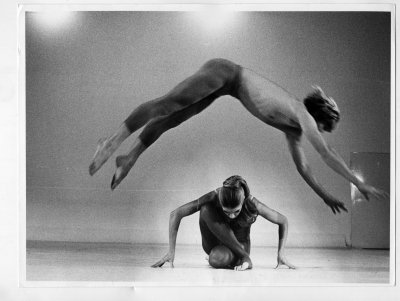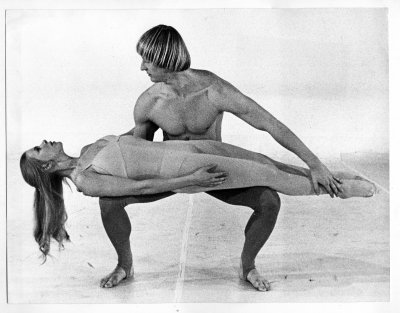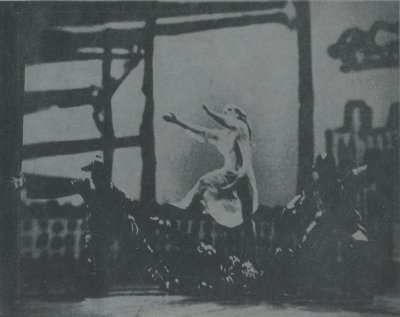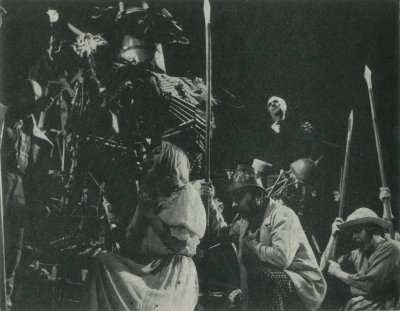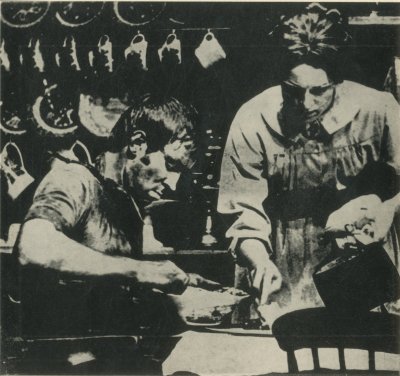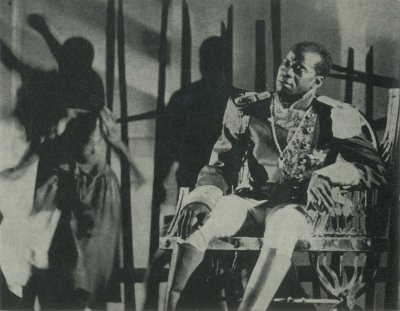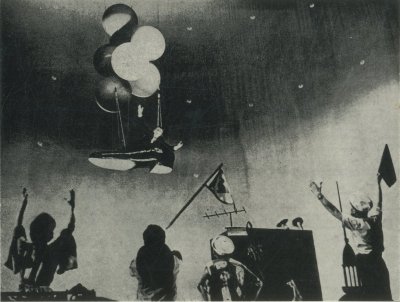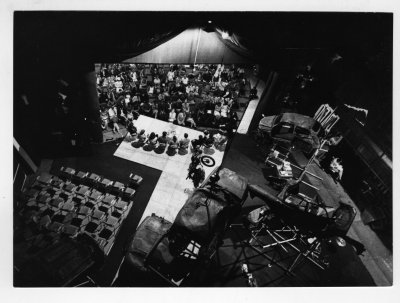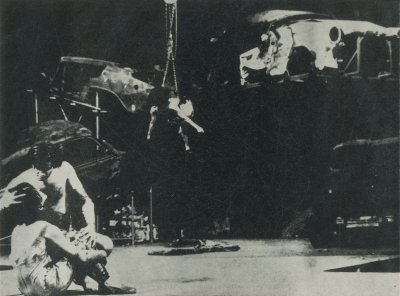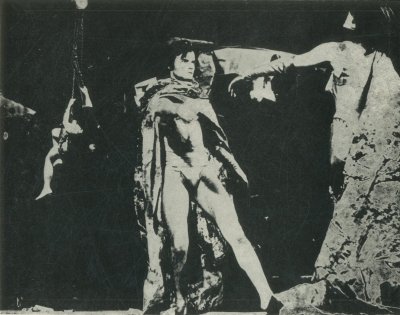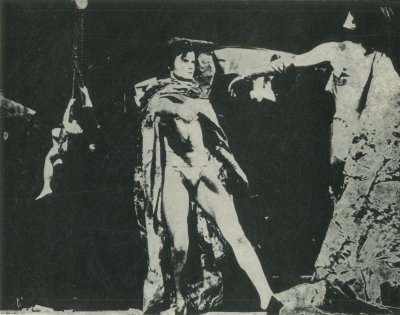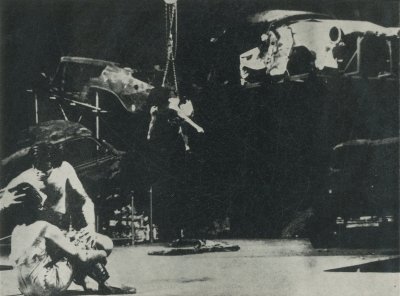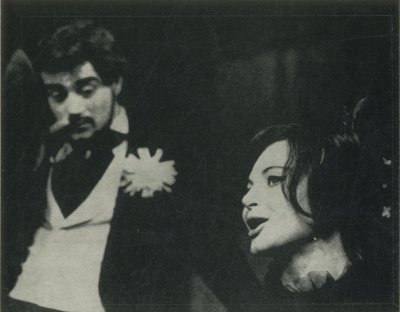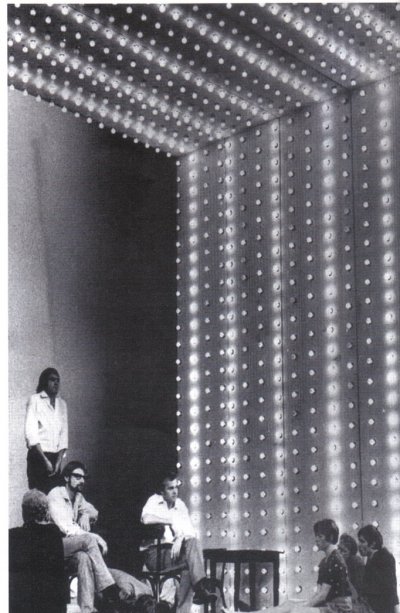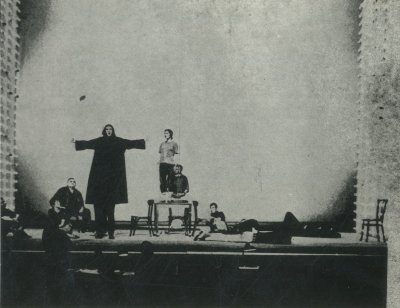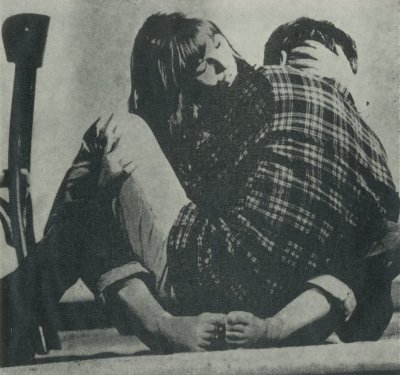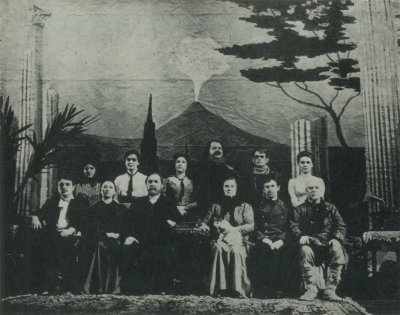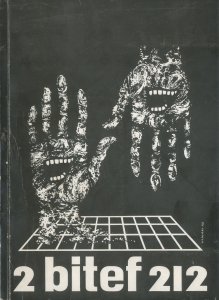
Dizajn / Design: Vladislav Lalicki (1935-2008)
POVODOM DRUGOG BITEFA
Drugi BITEF – kao i Prvi BITEF prošle godine – posvećen je novim pozorišnim tendencijama. Festival nema gotovu formulu novih pozorišnih tendencija pod koju želi da podvede sve učesnike festivala. Na početku svake sezone u Beogradu treba da se okupe pozorišta koja tragaju za novim formama i sadržajima. Jednom ta traganja mogu da izgledaju ekstremna, a drugi put biće potrebno tananije oko da otkrije novo u prividno tradicionalnoj formi neke predstave koja na tihi način pripada umetnosti budućnosti.
BITEF ima otvorena vrata za pozorišta svih zemalja. Učešće na BITEFU, međutim, nije reprezentativno. Svaka trupa predstavlja pre svega sebe i svoje švatanje umetnosti. Ipak BITEF vodi računa da se svake godine pojave trupe iz najrazličitijih zemalja. Tako ove godine prvi put učestvuju pozorišta iz Sovjetskog Saveza, Savezne Republike Nemačke, Nemačke Demokratske Republike i Švedske.
BITEF omogućuje svakoj nagrađenoj trupi da uzme učešće na narednoj smotri. Tako ove godine ponovo učestvuje Divadlo na zábradli iz Čehoslovačke, a takođe nagrađeni, Teatr Laboratorium iz Vroclava i Teatrul de comedie iz Bukurešta su zadržali pravo da učestvuju na III BITEFU 1969. godine.
BITEF – pored dramskih predstava – ima nameru da svake godine prikaže svojoj publici one scenske umetnosti koje različitim putevima utiču na moderno pozorište. Prošle godine jedno veče bilo je posvećeno umetnosti drevne igre katakalija. Ove sezone BITEF upoznaje svoje gledaoce sa umetnošću moderne igre, koja vizionarskom koreografijom Alwin-a Nikolais-a (SAD) i Birgit Cullberg (Švedska) teži umetnosti „totalnog teatra“.
BITEF ne želi da bude mesto na kome će se samo nizati predstave. Za vreme BITEFApublika će imati priliku da se u dijalozima sa stvaraocima sretne sa tvorcima predstava, da prisustvuje razgovorima Okruglog stola, a u Galeriji 212 vidi najnovije tendencije u likovnoj umetnosti i eksperimentalnom filmu.
ON THE OCCASION OF THE FIRST BITEF 212
After some years of consideration the Belgrade avantgarde theatre Atelje 212 has decided to hold a Belgrade International Theatre Festival (BITEF 212), from September 8 to September 30, 1967. The festival is conceived as a rally of new theatrical trends throughout the world. BITEF 212 does not wish to impose a ready formulae of new theatrical trend on participants of the festival, but it is certain that new theatre tendencies, are, not the avantgarde of yesterday, but the theatre of tomorrow.
BlTEF 212 would like all the groups who are truly seeking for new contents and forms to meet in September in Belgrade, and show what they consider new in the time we live in.
BITEF 212 does not limit itself to the little type of theatre group, nor does it exclude the possibility of an artist presenting his own vision of the theatre. BITEF 212 has an open door for the theatres of all nations offering each participating country the opportunity of presenting its conception of the new trends in the world of the theatre.
Up to ten theatrical groups from each country are expected, but the presence of a larger number of groups from a particular country is not excluded, if such country possesses different trends all of which should be presented at the Festival. In this respect participation at the Festival is not intended to be representative, but each group will represent its own conception of art.
Glavni program / Main Programme
013 Compagnie Víctor García (Pariz, Francuska); Fernando Arabal: Groblje automobila; režija: Viktor Garsija (Grand Prix, Nagrada publike) / Compagnie Víctor García (Paris, France); Fernando Arrabal: El cementerio de automóviles (Cimetière des voitures / Car Cemetery); direction: Víctor García (Grand Prix, Audience Award)
014 Divadlo za branou (Prag, Čehoslovačka); Johan Nestroj: Uže sa jednim krajem; režija: Otomar Krejča / Divadlo za branou (Prague, Czechoslovakia); Johann Nestroy: Provaz o jednom konci (The Single-Ended Rope); direction: Otomar Krejča
015 Theater Bremen (Bremen, Savezna Republika Nemačka); V. Šekspir: Mera za meru; režija: Peter Cadek / Theater Bremen (Bremen, Federal Republic of Germany); W. Shakespeare: Maß für Maß (Measure for Measure); direction: Peter Zadek
016 Бољшој драматическиј театр имени Горкога (Lenjingrad, Savez Sovjetskih Socijalističkih Republika); M. Gorki: Malograđani; režija: Georgij Tovstonogov (Grand Prix) / Gorky Bolshoi Drama Theater (Leningrad, The Union of Soviet Socialist Republics); Макси́м Го́рькій (M. Gorky): Meщane (The Smug Citizens); direction: Георгий Александрович Товстоногов (Georgij Tovstonogov); (Grand Prix)
017 Slovensko Narodno Gledališče – Drama (Ljubljana, Jugoslavija); Primož Kozak: Kongres; režija: Žarko Petan / Slovenian National Theatre – Drama (Ljubljana, Yugoslavia); Primož Kozak: Kongres (Congress); direction: Žarko Petan
018 The Dance Theatre of Alwin Nikolais (originalno: Playhouse Dance Company, Njujork, Sjedinjene Američke Države); Alvin Nikolaj: Imago, Somnilokvij; muzika i koreografija: Alvin Nikolaj / The Dance Theatre of Alwin Nikolais (originaly: Playhouse Dance Company, New York, United States of America); Alwin Nikolais: Imago, Somniloquy; music and choreography: Alwin Nikolais
019 Volkstheater in Rostock (Rostok, Nemačka Demokratska Republika); Peter Vajs: Balada o luzitanskoj nemani; režija: Hans Anselm Perten / Volkstheater in Rostock (Rostock, German Democratic Republic); Peter Weiss: Gesang vom Lusitanischen Popanz (Song of The Lusitanian Bogey); direction: Hanns Anselm Perten
020 Stary Teatr (Krakov, Poljska); Vladimir Majakovski: Hladan tuš; režija: Juzef Šajna / Stary Teatr (Krakow, Poland); Влади́мир Влади́мирович Маяко́вский (Vladimir Mayakovsky): Banя (The Bathhouse); direction: Józef Szajna
021 Cullberg baletten (Stokholm, Švedska); Gospođica Julija || Dionis || Euridika je mrtva; koreografija: Birgit Kulberg / Cullberg baletten (Stockholm, Sweden); Fröken Julie II Dionysos II Eurydike är död (Miss Julie || Dionysus || Eurydice is Dead); choreography: Birgit Cullberg
022 Narodno pozorište (Titovo Užice, Jugoslavija); Peter Vajs: Balada o luzitanskoj nemani; režija: Arsenije Arsa Jovanović / National Theatre (Titovo Užice, Yugoslavia); Peter Weiss: Der Gesang vom Lusitanischen Popanz (Song of The Lusitanian Bogey); direction: Arsenije Arsa Jovanović
023 The Royal Court, The English Stage Company (London, Velika Britanija); D. H. Lorens: Snaha / režija: Piter Gil (Grand Prix) / The Royal Court, The English Stage Company (London, United Kingdom); D. H. Lawrence: The Daughter-In-Law; direction: Peter Gill (Grand Prix)
024 La Compagnie Serreau-Perinetti (Pariz, Francuska); Eme Sezer: Tragedija kralja Kristofa; režija: Žan-Mari Sero / Compagnie Serreau-Perinetti (Paris, France); Aimé Césaire: La Tragédie du Roi Christophe (The Tragedy of King Christophe); direction: Jean-Marie Serreau
025 La Compagnie Serreau-Perinetti (Pariz, Francuska); Ežen Jonesko: Amede ili kako se otarasiti; režija: Žan-Mari Sero / Compagnie Serreau-Perinetti (Paris, France); Eugène Ionesco: Amédée ou comment s’en débarrasser (Amédée, or how to Get Rid of It); direction: Jean-Marie Serreau
026 Compagnie Serreau-Perinetti; Gij Foasi: Posmatrajući kako se ruše zidovi; režija: Andre-Luj Perineti / Compagnie Serreau-Perinetti: Guy Foissy: En regardant tomber les murs; direction: André-Louis Perinetti
027 Atelje 212 (Beograd, Jugoslavija); Aleksandar Popović: Krmeći kas; režija: Nebojša Komadina / Atelje 212 (Belgrade, Yugoslavia); Aleksandar Popović: Krmeći kas (Hog’s Trot); direction: Nebojša Komadina
| 024 La Compagnie Serreau-Perinetti (Pariz, Francuska); Eme Sezer: Tragedija kralja Kristofa; režija: Žan-Mari Sero / Compagnie Serreau-Perinetti (Paris, France); Aimé Césaire: La Tragédie du Roi Christophe (The Tragedy of King Christophe); direction: Jean-Marie Serreau | 016 Бољшој драматическиј театр имени Горкога (Lenjingrad, Savez Sovjetskih Socijalističkih Republika); M. Gorki: Malograđani; režija: Georgij Tovstonogov (Grand Prix) / Gorky Bolshoi Drama Theater (Leningrad, The Union of Soviet Socialist Republics); Макси́м Го́рькій (M. Gorky): Meщane (The Smug Citizens); direction: Георгий Александрович Товстоногов (Georgij Tovstonogov); (Grand Prix) |
|---|
| 018 The Dance Theatre of Alwin Nikolais (originalno: Playhouse Dance Company, Njujork, Sjedinjene Američke Države); Alvin Nikolaj: Imago, Somnilokvij; muzika i koreografija: Alvin Nikolaj / The Dance Theatre of Alwin Nikolais (originaly: Playhouse Dance Company, New York, United States of America); Alwin Nikolais: Imago, Somniloquy; music and choreography: Alwin Nikolais | 021 Cullberg baletten (Stokholm, Švedska); Gospođica Julija || Dionis || Euridika je mrtva; koreografija: Birgit Kulberg / Cullberg baletten (Stockholm, Sweden); Fröken Julie II Dionysos II Eurydike är död (Miss Julie || Dionysus || Eurydice is Dead); choreography: Birgit Cullberg |
|---|
